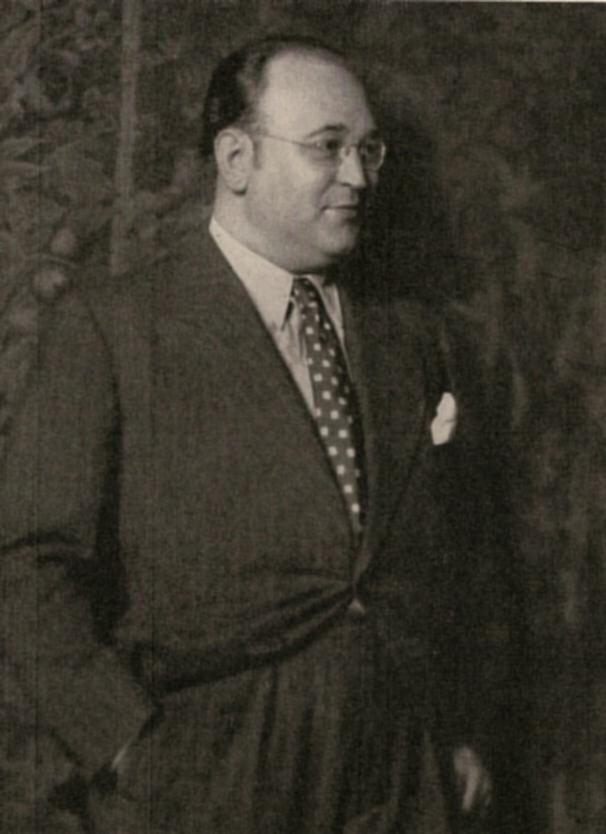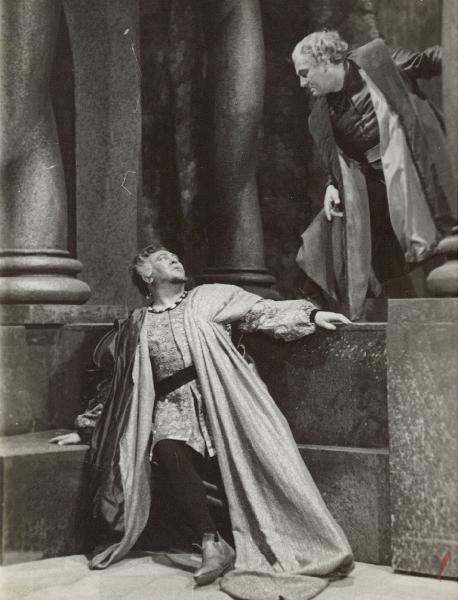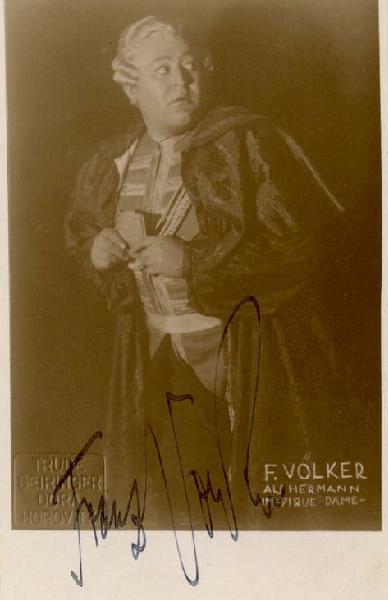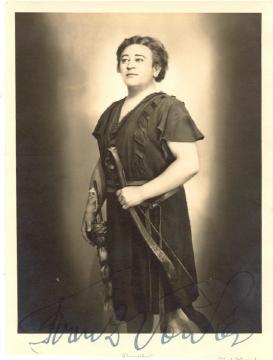Franz Völker




Franz Völker was certainly one of the best German tenors ever: a heldentenor capable of every vocal
shade and nuance that you'd wish for, with easy production of a radiant tone; not exactly very Italianate, but in the German
repertory simply fantastic: finally a Wagner tenor who sings instead of belting, shouting and coughing. And yet, there are also
few singers in the history of opera who fell as deep as he did: in 1939, all of a sudden, he lost in fact his voice. In his
later recordings (no disc recordings anymore, just live and radio), he
is so terrible that it's just painful to listen to him; it's not even a caricature of his former voice, he sounds like
95-year-old.
But examining the (numerous) recordings from his prime carefully, I don't hear any fault; so how come that extreme downfall?
It's remarkable how many German singers lost their voices prematurely in or soon after the Nazi period: Wittrisch, Bockelmann, Groh, Anders, Lorenz, Böhme, Meyer-Welfing, Fidesser, Niemar, Kötter, Hartmann, Fügel; even Domgraf-Fassbaender's voice, in
spite of his fantastic technique, lost much of its shine and flexibility
in the early 1940s, when the singer himself was still far from old (born 1897). Well, the voice is a delicate instrument, and
depends very much on the psyche; times were upsetting, and the exceeding majority of German singers was on shockingly friendly
terms with the Nazi regime; some voices may have fallen victim to delusion when the Nazis lost the war and had reduced
much-praised German glory to rubble (in the figurative and the literary sense), others may have waned under the pressure of
remorse when the respective singer realized what a monstrous ideology he or she had initially supported, or at least favored.
(A few other singers, like Lorenz, certainly suffered from the constant pressure of living in a system they did not
support.)
Völker had been a bank clerk, and sang in a choir as a pastime; in 1925, he was discovered in an amateur singing
competition, Clemens Krauss – then director of the Frankfurt opera – organized brief vocal training for him and
hired him in 1926 (debut role: Florestan). In 1931, he went to Vienna with Krauss, who had become director of the Staatsoper
there; and in 1935, he went again with Krauss, this time to the Berlin Staatsoper. But that 1935 move was not a harmless, normal
career step: Krauss had been lured by the Nazis with lots of money and excellent working conditions to come to Berlin, in a
successful attempt to support their imperialistic appetite on the field of cultural politics. Because he didn't come alone to
Berlin; he took the most important singers of "his" Vienna Staatsoper with him, Viorica Ursuleac, Karl Hammes (a fierce Nazi),
Gertrud Rünger, Josef von Manowarda (another fierce Nazi)... and Völker. The Vienna Staatsoper
was left with a much reduced troupe of singers, and had grave difficulties to stage many operas for years to come (in fact,
until Nazi Germany took over the country in 1938). That coup weakened the
(authoritarian and German national, but nonetheless firmly anti-Nazi) Austrian regime on the level of cultural representation,
and opera has always been the dearer to the hearts of the Austrian elite than any other form of representation. With all the
I've-only-lived-for-my-art-and-never-thought-of-politics self-concept, and even if he just followed his mentor Krauss, it's
impossible that Völker didn't apprehend what he had been participating in.
As long as his voice was healthy, he had a splendid career, also internationally: La Scala, Rome, Maggio Musicale, Paris
Opéra, Covent Garden, Brussels, Amsterdam, Hamburg, Munich – and above all, Bayreuth from 1933. That was all over
from 1939 onwards (only Bayreuth continued to employ him until 1942). After the war, he sang in Munich until retiring in 1952.
Fidelio – Frankfurt, Oper, 2 November 1926 Tristan und Isolde (Junger Seemann) – Frankfurt, Oper, 12 January 1927 Der Freischütz – Frankfurt, Oper, 5 February 1927 Der fliegende Holländer (Erik) – Frankfurt, Oper, 1 April 1927 Turandot (Altoum) – Frankfurt, Oper, 14 August 1927 Doktor Faust (Herzog von Parma) – Frankfurt, Oper, 18 August 1927 Der Rosenkavalier (Sänger) – Frankfurt, Oper, 21 August 1927 Jonny spielt auf – Frankfurt, Oper, 22 October 1927 Die Meistersinger von Nürnberg – Frankfurt, Oper, 30 October 1927 Der Zigeunerbaron – Frankfurt, Oper, 4 February 1928 La forza del destino – Frankfurt, Oper, 10 February 1928 Il trovatore – Frankfurt, Oper, 20 May 1928 Cavalleria rusticana – Frankfurt, Oper, 28 June 1928 Das geheime Königreich (by Krenek) – Frankfurt, Oper, 9 October 1928 Aida – Frankfurt, Oper, 18 November 1928 Die Fledermaus (Alfred) – Frankfurt, Oper, 26 December 1928 Die Walküre – Frankfurt, Oper, 12 May 1929 Fra Diavolo – Frankfurt, Oper, 7 November 1929 Das Land des Lächelns – Frankfurt, Oper, 30 November 1929 Indigo – Frankfurt, Oper, 15 March 1930 Lohengrin – Frankfurt, Oper, 6 April 1930 Belshazzar (by Händel) – Frankfurt, Oper, 16 April 1930 Der Bettelstudent – Frankfurt, Oper, 26 June 1930 Tannhäuser – Frankfurt, Oper, 11 January 1931 Così fan tutte – Salzburg, Festspielhaus, 14 August 1931 Pagliacci – Wien, Staatsoper, 20 October 1931 Pikovaja dama – Wien, Staatsoper, 10 May 1931 Don Carlo – Wien, Staatsoper, 10 May 1932 La Juive – Wien, Staatsoper, 26 October 1932 Die Frau ohne Schatten – Salzburg, Festspielhaus, Summer 1932 Rienzi – Wien, Staatsoper, 25 March 1933 Die ägyptische Helena (Menelas) – Salzburg, Festspielhaus, 14 August 1933 Otello – Wien, Staatsoper, 15 December 1933 Die Zauberflöte – Wien, Staatsoper, 4 November 1934 Die ägyptische Helena/revised version – Berlin, Staatsoper, 30 March 1935 Carmen – Berlin, Staatsoper, 18 April 1937 Parsifal – Bayreuth, Festspielhaus, 3 August 1938 Tiefland – Berlin, Staatsoper, 14 October 1939 Dalibor – Berlin, Staatsoper, 5 October 1940 Guntram – Berlin, Staatsoper, 13 June 1942 Mariana (Nazified version of Nicolai's Il proscritto) – Berlin, Staatsoper, 3 March 1943 I wish to thank Daniele Godor for the recording (Pagliacci) and picture (top). I wish to thank Thomas Silverbörg for the recordings (operetta pastiche, Lohengrin). References for the repertory: Stimmen, die um die Welt gingen, no. 50, December 1995 References for the biography: Kutsch & Riemens | |